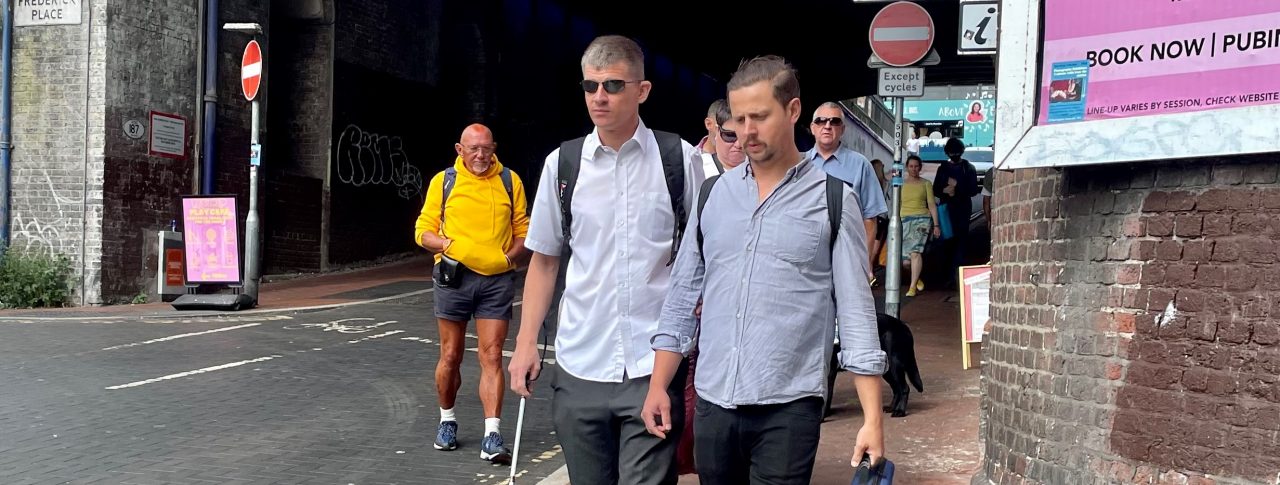Travelling blind: my injury caused by pavement parking
Sight Loss Council Engagement Manager, David Smith, like many blind and partially sighted people, has collided with vehicles due to pavement parking. This includes a truck full of scaffolding, a delivery lorry, an open tail gate of a car, and a motorbike.
In this blog, he explains how a scaffolding truck parked on the pavement caused him significant injury and impacted his confidence to walk down the streets near his home. He also joins our call for new legislation to tackle pavement parking nationwide.
My injury caused by pavement parking
 “A few months ago now, I was taking a walk around my local neighbourhood to get some fresh air. Being blind and a long cane user, I tend to stick to pavements. I only walk in areas that I know well so that I don’t get disorientated or lost. It was a fine day and, as I usually do, I was wearing sunglasses. This is mainly to protect my eyes if I were to walk into something and to cut down the bright glare that I get in brighter conditions.
“A few months ago now, I was taking a walk around my local neighbourhood to get some fresh air. Being blind and a long cane user, I tend to stick to pavements. I only walk in areas that I know well so that I don’t get disorientated or lost. It was a fine day and, as I usually do, I was wearing sunglasses. This is mainly to protect my eyes if I were to walk into something and to cut down the bright glare that I get in brighter conditions.
“I was only about 10 minutes away from home, on a relatively narrow pavement, when I was hit directly between my eyes at the bridge of my nose, bursting the skin and bending my sunglasses. The sudden impact and immediate pain stopped me in my tracks. I remember thinking ‘what an earth was that?’. I also wondered ‘am I somewhere different to where I think I am’ and gone off track.
“After a minute or two, I gingerly felt around and discovered that I had walked in to a metal scaffolding pole that was sticking out the back of a scaffolding truck.
“Due to the height of the poles and that they were sticking out, my cane wouldn’t have reached them to detect a blockage.
“I worked out that I was in the correct place by finding the kerb edge that I had been tracking, and slowly worked out that the truck was parked on the pavement leaving no space to get past. I had to walk out in to the road, alongside the truck, and then back on to the pavement where I headed straight back home nurturing a bleeding face and dented pride.
“I couldn’t hear any voices and no-one came out to me so I can only assume the vehicle owners must have been on a break or at the rear of the building where they were working.
It knocked my confidence to travel independently
“It wasn’t until I got home that I took in the event fully. I was shaken up and very frustrated that such an accident happened in an area I know very well. Fortunately I’m not someone that takes such accidents to heart but it did knock my confidence. Certainly for the next month or so, I only took necessary journeys (no leisure walks) and walked a lot slower. I was a lot more focussed on where I was and I continuously listened for any clues of potential danger. This additional concentration meant that walking around was tiring and hard work.
What can we do differently?
“As a blind person, I feel quite strongly that pavements should be a safe place and as much as possible, hazard free. I would like there to be a pavement parking ban and for there to be no vehicles blocking mine or anyone’s access.
“If building works are taking place, then vehicles shouldn’t be blocking the pavement. When this is the case and it is unavoidable, then there should be a human stationed with the vehicle. They should look out for anyone that may require support to navigate past safely until that the vehicle can be moved. This applies to delivery drivers too as they often park on the pavement. When questioned, they usually say “I’m only going to be there for two minutes”. But it’s those two minutes that could ruin someone’s day.”
Get involved
We encourage you to write to your Members of Parliament (MPs) and the Secretary of State urging swift action on pavement parking. Together, our collective voice will ensure the safety of blind and partially sighted people remains a top priority.
Join our campaign to ban pavement parking
Stay in the know
Stay up to date with news from Sight Loss Councils by signing up to our mailing list.
Publication date: 09 January 2024

